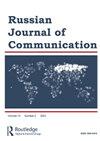Dividing social networks: Facebook unfriending, unfollowing, and blocking in turbulent political times
Q1 Social Sciences
引用次数: 7
Abstract
ABSTRACT It has been argued that by allowing users to unfriend, unfollow, and block political and cultural ‘others,’ Facebook facilitates the discouragement of dialog between those holding different views on political issues. Using a case study of a civil confrontation in Ukraine, the paper analyzes the reasons for unfriending political ‘others’ reported by 699 respondents of a qualitative survey. Its findings are in line with researchers who have also found that the likelihood of selective avoidance is higher among people who are more politically active, emotionally involved, and who have more online friends. The paper also discusses an interesting discovery that has not been previously considered. The respondents often shunned political ‘others’ out of suspicion that they were trolls. As this paper suggests, whether real or imagined, trolling has turned out to be a real force influencing people’s decisions to withdraw from communication on the most important issues of public life.分化社交网络:在动荡的政治时期,Facebook取消好友、取消关注和屏蔽
有人认为,Facebook允许用户解除好友、取消关注和屏蔽政治和文化上的“他人”,从而阻碍了对政治问题持有不同观点的人之间的对话。本文以乌克兰的民间对抗为例,分析了699名定性调查受访者解除政治“他人”好友关系的原因。研究人员还发现,在政治上更活跃、情感上更投入、网友更多的人群中,选择性回避的可能性更高。本文还讨论了一个以前没有考虑到的有趣的发现。受访者通常会避开政治上的“其他人”,因为他们怀疑这些人是喷子。正如本文所表明的那样,无论是真实的还是想象的,拖钓已经被证明是一种真正的力量,影响着人们在公共生活中最重要的问题上退出沟通的决定。
本文章由计算机程序翻译,如有差异,请以英文原文为准。
求助全文
约1分钟内获得全文
求助全文
来源期刊

Russian Journal of Communication
Social Sciences-Political Science and International Relations
自引率
0.00%
发文量
0
期刊介绍:
Russian Journal of Communication (RJC) is an international peer-reviewed academic publication devoted to studies of communication in, with, and about Russia and Russian-speaking communities around the world. RJC welcomes both humanistic and social scientific scholarly approaches to communication, which is broadly construed to include mediated information as well as face-to-face interactions. RJC seeks papers and book reviews on topics including philosophy of communication, traditional and new media, film, literature, rhetoric, journalism, information-communication technologies, cultural practices, organizational and group dynamics, interpersonal communication, communication in instructional contexts, advertising, public relations, political campaigns, legal proceedings, environmental and health matters, and communication policy.
 求助内容:
求助内容: 应助结果提醒方式:
应助结果提醒方式:


